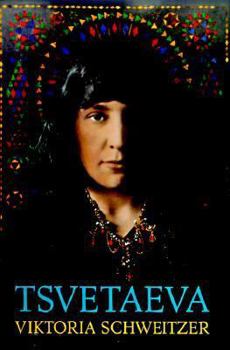Tsvetaeva
Select Format
Select Condition 
Book Overview
Marina Tsvetaeva was, with Akhmatova, Mandelstam and Pasternak, one of the four great Russian poets of this century. In a tragic time her fate was perhaps the most tragic of all. Born in 1892, the... This description may be from another edition of this product.
Format:Hardcover
Language:English
ISBN:0374279454
ISBN13:9780374279455
Release Date:January 1993
Publisher:Farrar Straus & Giroux
Length:413 Pages
Weight:1.95 lbs.
Dimensions:9.8" x 1.5" x 6.3"
Customer Reviews
1 rating
The Prisoner of Poetry
Published by Thriftbooks.com User , 19 years ago
There are two broad categories of biography that you can read. One is the kind in which the author tackles a whole period in a country's history, bringing in the culture that created his/her subject as well as the influence that character had on the times. Good examples of this sort are Samuel Eliot Morison's "Admiral of the Ocean Sea" about Columbus, John Womack Jr.'s "Zapata and the Mexican Revolution", or Paul Murray Kendall's "Louis XI"---all first class biographies. The second kind is more intimate; a narrower focus on the character, in which the author tries to plumb the psychological depths of the person and reveal the motivations and underlying feelings behind their achievements. TSVETAEVA is certainly of the second variety. Though Marina Tsvetaeva, one of Russia's foremost poets in the 20th century, lived through wars, revolution, repression, and radical social-economic change in her country, the book pays minimal attention to any of it. If you, the reader, are not aware of the depth and sweep of all these things in Russia or the USSR in the years 1914-1941, you are not going to understand this book. The facts that Tsvetaeva was persona-non grata after the 1917 Revolution, that her works were suppressed till long after her death, that she had to be discovered by the younger generations, that one of Russia's great poets was not mentioned in schools for a long time---these important things are very much underplayed by the author, who seems to have written for a Russian audience alone. Painstakingly, lovingly reconstructed from the poems, the letters, the diaries, and many interviews, this biography is surely a labor of many years. For the details and for the many insights into the life and psychology of a complex woman out of tune with her times, I'd certainly award this book five stars, but on the other hand, it is packed with an enormous amount of detail, more than most non-Russian readers can absorb. I sometimes felt repelled by the cloying quality of the author's adulation of her famous subject. Also, the translations of the poetry are amazingly wooden. I can get no feeling of why Russians consider Tsvetaeva such a great poet, though I'm prepared to accept that she is. Tsvetaeva grew up before the Revolution in a well-off family. Her mother transferred a lot of her cultural aspirations to her, or we may say that Tsvetaeva inherited a lot of her mother's emotional intensity and need to be the center of all relationships around her. Ideas such as "money is filth" and "only the things of the spirit matter" were common among certain classes in Europe, but they lead to very unhappy lives if inherited money runs out. I find Tsvetaeva a most unpleasant person right from childhood, a person who could write that "it is stupid and indecent to be happy", a person who therefore would be in love with tragedy, loneliness and unhappiness all her life. She neglected and betrayed her husband, abandoned all her myriad lovers, drove he






